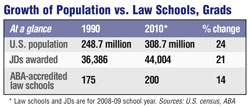Truth in Legal Education Will Help Prospective Law Students Make Informed Decisions

Photo by Neal Bredbeck
The legal profession right now is changing, affecting every lawyer, whether a 1961 or 2011 graduate. While lawyers remain typically averse to change, the profession has demonstrated an ability to respond to challenges creatively and effectively. Even in these difficult times law students have not made a mistake in choosing the law as their profession. It is crucial, as the voice of the profession, that the ABA help provide good information to prospective law school candidates so they can make informed decisions. The association calls this truth in legal education.
The ABA’s Young Lawyers Division, naturally, understands this issue very well. And it has taken the lead in coming up with solutions. It has adopted new policy urging law schools to improve the information they provide students and ensure specific metrics are featured in their communications. This should include detailed and accurate job placement data and education costs, and it shouldn’t stop there. Law schools should do this in a uniform way so that a prospective student can make a meaningful comparison. The YLD resolution is now set to be considered by the House of Delegates at the annual meeting in August.
This is not the only initiative intended to provide more transparency. The Standards Review Committee of the Section of Legal Education and Admissions to the Bar is reviewing the ABA-accredited law schools’ basic consumer information guideline, known as Standard 509. Another panel of the section is conducting a review of job placement data produced by law schools. These efforts are aimed at sending a strong message to law schools that they seriously consider what they report as well as how they report it. The association is committed to staying proactive on this issue and helping young people decide how, when and why to pursue a legal education.

Over the next few weeks, more than 40,000 women and men will graduate from law school. They are on their way to becoming lawyers at a dynamic time, one full of change, promise and risk for themselves and the profession they are joining. Megatrends such as technology; the move toward a globalized, borderless law practice; and a re-examination of the billable hour are just a few of the forces in play.
UNWAVERING COMMITMENT
while many things are in flux, this much is clear: Being a lawyer remains a special commitment. It is about much more than practicing law. It is defending the rule of law and advocating for fairness and access to justice.
That same commitment led John Adams, our first lawyer-president, to fight for an independent American nation. It spurred a small group of attorneys—133 years ago in Saratoga Springs, N.Y.—to create the ABA to defend liberty and pursue justice as the national voice of the profession. And it guided the late U.S. Supreme Court Justice Thurgood Marshall and other lawyers to march in the streets and litigate in the courtrooms to remind this country that “all men are created equal.”
These values are the foundation for the latest generation of lawyers in facing major issues of our day, including cuts to legal aid, decreases in access to the courts by the middle class and small business, and the increase in the diversity of American society. In talking to students nationwide these past few months, it’s clear that today’s young lawyers are up to the task, and that they share the passion and obligation of prior generations to use their new skills in service to society.
We need these young lawyers to right today’s wrongs. We also have to do right by them. Currently, many young lawyers are feeling great uncertainty regarding their future, and a lot of pressure about the debts they took on to pursue their education. There will always be a role and a need for good, new lawyers.
So to the graduates of the 200 ABA-accredited law schools, congratulations and welcome to an amazing path for your life’s work. To those in practice, reach out to the next generation. Share with them how you built success, and encourage them to expand their horizons by becoming active in local, state and national bar associations. Encourage them also to donate time to legal causes they care about, especially helping the poor in our society. This kind of public service has always been part of private sector legal work. It sharpens skills, builds a network and helps land a job. But most important is that it will help shape how this generation of lawyers, like the ones before them, will be remembered.



